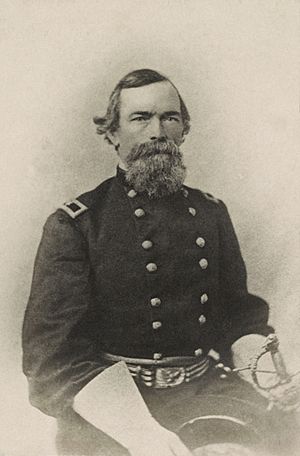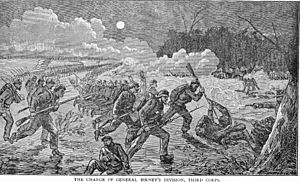William Birney facts for kids
Quick facts for kids
William Birney
|
|
|---|---|

William Birney
|
|
| Born | May 28, 1819 Huntsville, Alabama |
| Died | August 14, 1907 (aged 88) Forest Glen, Maryland |
| Place of burial |
Oak Hill Cemetery, Georgetown, Washington, D.C.
|
| Allegiance | United States of America Union |
| Service/ |
United States Army Union Army |
| Years of service | 1861–1865 |
| Rank | |
| Battles/wars | American Civil War |
William Birney (born May 28, 1819 – died August 14, 1907) was an important person in American history. He was a professor, a general in the Union Army during the American Civil War, a lawyer, and an author. Birney strongly believed in ending slavery. He is well-known for helping thousands of free black men join the Union army.
William Birney was the son of James G. Birney, a famous leader against slavery from the South. His older brother, David B. Birney, also became a general in the Civil War. Another brother, James M. Birney, was the Lieutenant Governor of Michigan in 1860. Interestingly, his cousin, Humphrey Marshall, was a U.S. Congressman and a general for the Confederate States Army.
Contents
Early Life and Education
William Birney was born on May 28, 1819. He was born on his father's plantation near Huntsville, Alabama. He grew up there and in Danville, Kentucky.
Birney went to Centre College and Yale University. After college, he became a lawyer in Cincinnati, Ohio. He then spent five years living in Europe, mostly in France and England. For two years, he taught English literature at a college in Bourges, France. He was also involved in the revolutionary movement in France in 1848. Later, he wrote many articles for newspapers in England and America.
In 1853, Birney returned to the United States. He started a newspaper called the Daily Register in Philadelphia.
Joining the Civil War
When the Civil War began, William Birney joined the Union Army. He started as a captain on May 22, 1861. He was part of the 1st New Jersey Infantry Regiment.
Birney's first experience in battle was at the First Battle of Bull Run. He was later promoted to major in the 4th New Jersey Volunteer Infantry. He fought in important battles like Second Bull Run, Chantilly, and Fredericksburg. As a colonel, he also fought in the Chancellorsville.
Recruiting Black Troops
From 1863 to 1864, Birney had a very important job. He was one of three leaders in charge of enlisting black soldiers into the Union army. In this role, he helped create seven new regiments of black troops. He was named Colonel of the 22nd U.S. Colored Troops.
On June 9, 1863, he became a brigadier general. He was sent to Maryland to recruit even more black soldiers. In 1864, he led his regiments to fight in South Carolina. They also fought in campaigns in Florida, including the Battle of Olustee.
Later Campaigns
General Birney's brigade was later moved to Virginia. There, they joined other black regiments. These units formed the Third Division of the X Corps. This corps was led by Major General Benjamin F. Butler.
Birney's troops faced a tough defeat at the Battle of Chaffin's Farm. However, they played a key role in several battles. These fights took place along the defenses of Richmond. In December 1864, the black regiments from the X Corps joined with those from the XVIII Corps. They formed a new, all-black unit called the XXV Corps. Major General Godfrey Weitzel commanded this new corps.
Birney's regiments became the 2nd Division of the XXV Corps. They took part in the final attacks during the Siege of Petersburg in early 1865. After that, he led his division in chasing Robert E. Lee's Army of Northern Virginia. This happened during the Appomattox Campaign. William Birney left the volunteer army on August 24, 1865.
After the War
On July 20, 1866, U.S. President Andrew Johnson honored Birney. He nominated him to be a brevet major general of volunteers. This rank was effective from March 13, 1865. The United States Senate approved this honor on July 26, 1866.
After the war, Birney lived in Florida for several years. In 1874, he moved north to Washington, D.C.. He started a law practice there. He also served as the U.S. Attorney for the District of Columbia. He was a school board trustee until 1886.
Birney wrote many books and articles. His writings were about religion and history. In 1890, he wrote a biography about his father. It was called James G. Birney and His Times; the Genesis of the Republican Party.
William Birney passed away at his home in Forest Glen, Maryland on August 14, 1907. He was buried in the Oak Hill Cemetery in Georgetown (Washington, D.C.).
 | Isaac Myers |
 | D. Hamilton Jackson |
 | A. Philip Randolph |


